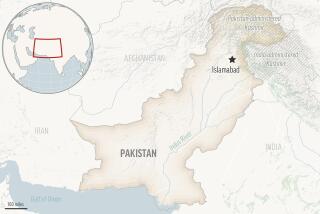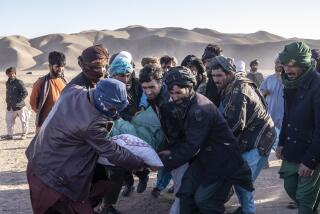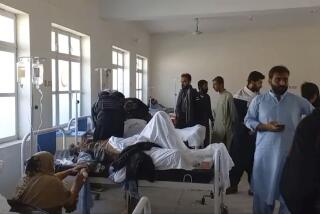Afghanistan mourns 16 apparently killed by U.S. soldier
Reporting from Kabul, Afghanistan â When gunfire echoed in the darkness before dawn, many villagers assumed it must be a night raid, in which U.S.-led troops swoop down on residential compounds across Afghanistan to arrest suspected insurgents. So the safest course, people thought, was to stay quiet and remain indoors.
But for some on Sunday, home was no safe haven. The gunman found them.
Chanted prayers and muffled sobbing filled the air on Monday during remembrances by Afghan villagers for 16 of their neighbors, nine of them children, who were killed a day earlier during a shooting rampage that authorities said was undertaken by a lone American soldier near his base in the Taliban heartland of southern Afghanistan.
Amid the mourning, villagers in the Panjwayi district of Kandahar province recounted a harrowing ordeal of huddling in darkened rooms early Sunday, only to learn that the fate of some would be far worse than detention.
The attacker, identified by U.S. officials as an Army sergeant who had been working with local Afghan police, approached on foot, walking almost a mile from his base to reach a cluster of mud-brick homes. He then moved on to another group of homes about half a mile away.
In all, he broke into three residences, shooting some victims point-blank, execution style, and cutting others down as they tried to flee, witnesses said. The gunman then methodically tossed blankets atop the bodies of some of those he had killed and set them on fire, according to villagersâ accounts.
âWe took pictures of the dead bodies, children and old men, and mattresses that were burned,â said Haji Mohammad Noor, head of the Panjwayi district council.
Eleven of the dead were from one family, he said, though the head of that household, a man named Wazir, was spared because he was at a social gathering in another village that night. He broke down when he returned home and saw what had happened, neighbors said.
In addition to those killed, the assailant wounded five people, who were taken to NATO medical facilities for treatment.
As the full import of the shootings sank in Monday across Afghanistan, it was what did not happen that might have been the most notable. It was a day given over to grieving, and no small measure of anger â but not the furious riots many had expected.
Aides to President Hamid Karzai, a native of Kandahar province, said the Afghan leader spent hours on the phone with tribal elders and influential local figures, urging them to stave off violent demonstrations like those that followed the burning of copies of the Koran at a U.S. military base last month. Those protests left more than 30 people dead, including six U.S. soldiers killed by Afghan forces while the weeklong protests raged.
By helping prevent a deadly outburst, Karzai, who has frequently been at odds with the U.S. administration in recent months, may have gained key leverage in negotiating a long-term âstrategic partnershipâ with the Americans. Key among his demands is an end to the hundreds of U.S.-led night raids that take place each month across Afghanistan.
Western military officials call the late-night strikes one of the most successful means of capturing and killing insurgent fighters and field commanders. But the raids are widely loathed by Afghans, who consider strangers forcibly entering their homes and seeing the familyâs women to be a grave cultural affront. Human rights groups also say these home invasions pose a risk to civilians, though military officials say most of the surprise strikes are carried out without a shot being fired.
Although elite Afghan forces are being trained to take the lead in such operations, they still rely heavily on U.S. support. Karzai has demanded that night raids be conducted only by Afghan troops.
Karzai and other Afghan leaders have also sought greater accountability for any wrongdoing by U.S. troops in Afghanistan, saying they should be subject to Afghan law. In the capital, Kabul, the Afghan parliament passed a resolution Monday condemning the âbrutal and inhumanâ shootings. The lawmakers demanded a public trial for the suspect in Afghan court, but that is almost certain not to happen.
U.S. and coalition officials said the sergeant would face Western military justice, in keeping with agreements governing the foreign troop presence in Afghanistan.
The Taliban, meanwhile, vowed vengeance for the âinhumane crimeâ in Panjwayi, and scoffed at reports that the attacker might have been mentally ill.
âIs there any military ⦠in the entire world which gives legality for unstable persons to be armed and drafted into the military and then be given the duty of so-called peacekeeping?â the group asked in a statement on its website.
Until two years ago, the Taliban had a strong presence in Panjwayi, but a series of U.S.-led operations pushed the insurgents from longtime havens there. However, the area remains dangerous, both to U.S. troops and Afghan civilians, who often fall victim to insurgent-planted roadside bombs.
Following Islamic custom, villagers buried the victims of the massacre within hours of the attack. But mourners, including some who traveled from surrounding villages miles away, staged solemn condolence ceremonies on Monday, gathering in mosques and homes, said Sardar Mohammad Nazari, the chief of police in Panjwayi district.
Nazari said tribal elders and community leaders had called for calm, doing what they could to soothe those who were grieving. âWe asked the people to show restraint, and then sent them back to their homes,â he said.
The Western military promised that the slaughter of the villagers â the worst known atrocity apparently carried out deliberately by a Western soldier in more than a decade of warfare here â would not go unpunished. The suspect was being interrogated by military investigators, and a joint probe by U.S. and Afghan officials was underway.
Defense Secretary Leon E. Panetta said the staff sergeant could face the death penalty if convicted.
âHe went out in the morning, early morning, and went to these homes and fired on these families and then at some point after that came back to the forward operations base and basically turned himself in, told individuals what happened,â Panetta said in an interview as he flew aboard a U.S. Air Force jet to Kyrgyzstan.
The soldier, who was reportedly spotted walking off the base by an Afghan soldier, had previously served three tours of duty in Iraq and was on his first posting in Afghanistan, the commander of the U.S.-led coalition, Gen. John Allen, said in an interview on CNN on Monday.
Allen, who called the killings âdeeply regrettable,â said the mission in Afghanistan âremains on trackâ and that âthe relationship will only grow stronger between Afghanistan and the United States and Afghanistan and the international community.â
âThe important thing is that the findings will lead to appropriate legal procedures,â German Brig. Gen. Carsten Jacobson, a spokesman for the North Atlantic Treaty Organizationâs International Security Assistance Force, told reporters in Kabul. âJustice will be done.â
Times staff writer David S. Cloud en route to Kyrgyzstan, special correspondent Hashmat Baktash in Kabul and a special correspondent in Kandahar contributed to this report.
More to Read
Sign up for Essential California
The most important California stories and recommendations in your inbox every morning.
You may occasionally receive promotional content from the Los Angeles Times.










